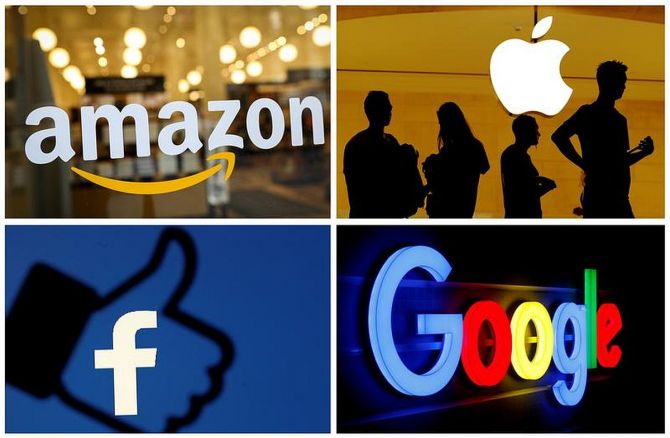Amazon, Google, Apple and Facebook are both a boon and a bane for angel investors, VCs as well as start-ups.
If the Big Tech companies get broken up and their powers to acquire get significantly curbed therefore, the whole ecosystem will need to change, says Prosenjit Datta.

The US justice department has sued Google for anti-competitive behaviour.
Eleven states have joined the suit.
This follows a year and a half of investigations against the Big Tech quartet — Amazon, Google, Apple and Facebook — by the US House Judiciary Subcommittee on Antitrust and a 400-page report written by the majority staff of the Democratic lawmakers in the subcommittee.
These are early days and over the next month and a half you can expect many more lawsuits — against Google and against the other three as well, as more states and other interested parties also file cases.
It will take time — years possibly — before the final judgments are pronounced.
Meanwhile, venture capital (VC) firms and entrepreneurs in Silicon Valley and across the world are already grappling with the implications.
Their fate is intricately linked to the Big Four; any action that affects these companies also has a bearing on their futures.
Amazon, Google, Apple and Facebook — and even Microsoft, though it is not under investigation currently (it faced a similar antitrust investigation in 1998) — are both a boon and a bane for angel investors, VCs as well as start-ups.
This is not merely in Silicon Valley but in many other countries, including India.
The bane part has been often highlighted — the Big Four control advertising and technology platforms and they can charge extortionate fees from the start-ups that require visibility to survive.
So if a start-up wants to display its app on the Apple App store or Google Play Store, it needs to give a hefty cut — 30 per cent of all revenues to the app stores.
Similarly, any seller needs to pay hefty fees to be on the Amazon marketplace.
Many start-ups are also dependent on the cloud tech platforms of AWS or Microsoft or Google for their hosting.
They are dependent on the Big Four — or rather Big Five — for access to technologies, visibility on search engines and platforms and advertising revenues.
Start-ups also lead a precarious life.
Any of the Big Tech companies can go from a friendly platform to a huge competitor overnight.
It can happen in pure digital products where a start-up can find that it is being undercut by a similar service offered by the platform.
Or even on Amazon, where the retailer has driven competitors out of business by copying their products and selling at a cheaper price even if it incurs losses until the competitor is bankrupt.
The story of Amazon and Diaper.com is the best known but such cases are actually quite common.
The boon part is less discussed.
All the Big Tech companies have their own venture capital firms as well as incubators and they back interesting start-ups.
This allows many start-ups to take birth and grow.
But it is really the M&A arms of the Big Tech companies that are crucial for the current VC and start-up ecosystem.
Every year, the Big Tech companies buy out several dozen start-ups.
Some of these companies would have been competitors if they were allowed to grow — like Instagram would have been if Facebook had not bought it out or Diaper.com would have been for Amazon.
Others though are simply working in niche areas and in some, the acquisition is made just to hire talented engineers — what is often dubbed the “acqui-hire” strategy.
For many start-ups and VCs therefore, the goal is for the company to be acquired by the big tech companies.
Some VCs will fund the entrepreneur with an interesting idea until he builds a good product and manages $50 million-$100 million revenues so that it attracts the attention of one of the giants.
This is the exit strategy for the majority of entrepreneurs and VCs.
Sure, a handful have the ultimate goal of going for an initial public offering (IPOs) — but that is a small fraction of the total system.
If the Big Tech companies get broken up and their powers to acquire get significantly curbed therefore, the whole ecosystem will need to change.
This could mean that VCs would become more cautious about whom they back — but equally more ready to back promising start-ups for a longer period and with more funds until these go for IPOs.
It could also mean that start-ups that have often shunned traditional businesses looking to buy them may change their behaviour in future and the list of potential acquirers will grow.
For example, most companies working on autonomous mobility tech today prefer to ally or sell out to Big Tech companies in Silicon Valley than to traditional automakers.
But if significant curbs are put on the Big Four, they may be less averse to other suitors.
There is a third possibility — the rise of Asian giants like Softbank or Alibaba or Tencent who step into the breach.
This could create a power shift from Silicon Valley to Asia despite political implications.
Any which way, unless the judgments call for status quo in the antitrust cases, the start-up and VC ecosystem will change quite dramatically when this affair closes.
Photograph: Reuters
Prosenjit Datta is former editor of Business Today and Businessworld and founder and editor of Prosaicview, an editorial consultancy.











